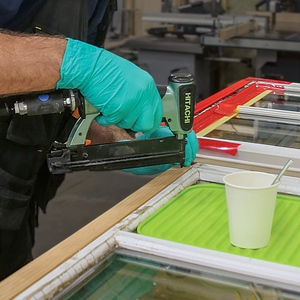I am tired of spending too much time adding up material, worried that I might lose my %@ on a job. I sometimes spend more time on the bid than the job. I have a bad habit of not being able to say “no” to any job, so I might as well know how to bid it right. I keep thinking that ,in time, I will be good enough to estimate a job by looking at it and adding 20%. Actually I have gotten pretty good at the smaller jobs. I just had a client ask me to do a work-up on a bath remodel. She wanted it figured 3 different ways. cheap..cheaper..cheapest. I took too long and lost a $10,000. job.
I dread doing estimates because they eat my time up.
are there any good estimating programs out there that will help me out,..ones that are tested and used by GC’s.



















Replies
She wanted it figured 3 different ways. cheap..cheaper..cheapest.
First you need to find yourself a better grade of clients!
Mr T
Do not try this at home!
I am an Experienced Professional!
Are you doing free estimates? If so, you are creating your own problem by giving them the chance to walk all over you.
Tell a client who requests that level of service that your time for estimating is $50/hr and that it will take about two or three days for each estimate. Then ask for a deposit.
This is galling because it implies that design decisions are flexible so she wants you to do the design work too for free. That's the onlyway to change costs this much.
Somebody who wants a stright price needs to be able to provide you with details to base your price on.
Excellence is its own reward!
"in time, I will be good enough to estimate a job by looking at it and adding 20%"
That's not "being good"- that's being careless. Good estimating comes from having an understanding of your costs of doing business, material costs, productivity rates, and analysis of past jobs. "Adding 20%" to anything will only put you into bankruptcy court.
Regarding "good estimating programs"- there's no magic program or formula that's going to help you estimate jobs (beyond giving you a point of reference to compare to). They're all based on national average costs- not your costs of doing business. Focus your efforts on developing unit costs for the types of work you perform, cull unit pricing from your subs, and keep a list of material costs for typical materials you use. This should help reduce your time and improve your pricing dramatically.
Lastly, as someone stated- get better clients- "cheap, cheaper, and cheapest" should automatically indicate that you're spinning your wheels- unless your company motto is "we're the cheapest guys in town, and it shows". Piffin's got the right idea (as usual)- tell them that you charge for estimates- that'll weed out a good percentage of the time-wasters.
Bob
First, you should not be doing estimates, they should be proposals. I never bid work that doesn't come out of an architect's office.
Take the time to figure the job completely. The material part should be the easiest, the time involved is the difficult thing. Then add your overheads and profit. Then add your time for estimating the job.
The safest move to make is to qualify your price completely, especially for anything that is either not on the prints, or is a little fuzzy. Make sure you tell the client to ask the same of the other bidders, they must compare apples to apples.
I have never charged for proposals. Doing so will keep you off many bidding lists. I am rarely low bid, and have a very high closing rate. Most of my projects top $250,000.00 for remodels. My biggest closer is being able to disqualify the other lower bids due to errors and omissions.
I use LiteningFast Software, because it is flexible to my estimating style, and is compatible with my accounting software.
I'm not a builder, just a regular lurker. But something we try to do in our consulting business is this:
We are often asked for proposals on projects. The experience and intellectual effort required to develop a plan and a proposal are often major efforts, and they often provide the client a blueprint for the project...
We say this:
"We will develop a proposal and detailed project plan for you. Your investment in this phase will be $XX. If you select us for the project, we will rebate that amount into the overall cost of the project. If you do not choose to work with us, you pay us the $xx for our detailed roadmap."
This will certainly exclude you from some projects.... especially the price only buyers. But the jobs you win will tend to be better all around. It's certainly worth a try on bigger $$ projects.
(I know this doesn't answer your original question... but food for thought)
She wanted it figured 3 different ways. cheap..cheaper..cheapest.
I hope that I would have had enough sense at that point, to submit a respectful "No Bid". While most contractors will never pass on a job, I would rather walk at an early stage, than get caught up in re-working multi-level estimates.
If the potential customer knows what they want, I can estimate my price for that work. If not, I try to help them decide. If they can't be firm in a decision, then I tell them taht I can't be firm on a price.
I also agree with Piffin's comments. My business plan includes a step to be taken within one year. I will be weeding out a number of potential customers, before I waste valuable time.
For those with a firm design, the first phone call will include a "no less than $XX" conversation. If they are still interested, then I'll visit for a firmer estimate.
For those who want to discuss the possibilities, the phone call will include my hourly rate for dream-evaluation and reality-checking services.
"dream-evaluation and reality-checking services"- that's what I should out on my business cards (being an estimator and consultant by trade)....lol
Bob
Excelent topic,
some great advice was givin on this topic, thanks all for your input.
I've come to believe that accurate estimating is one of the single most important skills for a contactor to develop. When you say you want to do it "quickly" it implys you dislike it and want to go do something else instead. If it's true that you dislike it, seems to me you'll have to change your mindset about it before you'll ever get good at it. I think there is an "interest, success, enjoyment" cycle feeds on itself and is critical to any endeavor.
How can you reframe your idea of estimating from a negative activity to be rushed through, into an enjoyable productive activity?
I do dislike it! But it is a neccesity. As with anything else i do,..I want to do it best! Wether I really am the best or not, (usually not), I still want to do it well, and quickly so I can move on to other things